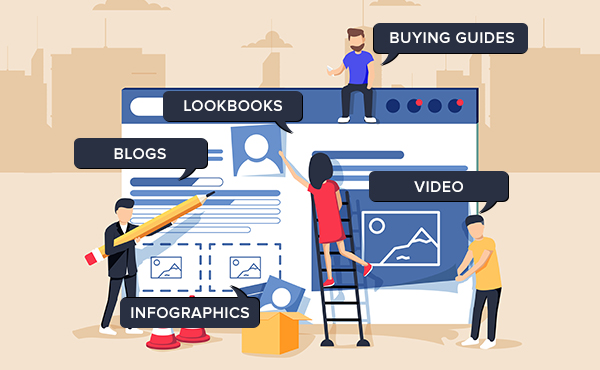An ecommerce solutions provider must be able to help retailers exceed their customers’ expectations by making every touch point with the brand personalized, easy, and relevant. Customers, today, are looking for more than just online product information and an option to place orders on a website or mobile application. They are looking for a platform that facilitates seamless and healthy engagement with their favorite brands, and expression of their opinions and suggestions. Such an open and flexible ecommerce platform is the need of the hour for increasing customer satisfaction and increasing business revenue. A basic ecommerce solutions company must be able to offer fulfilment methods like ‘buy online’ and ‘pick up in store,’ so that customers are happy and keep coming back to the brand.
WHAT DO ECOMMERCE SOLUTIONS HELP CUSTOMER DO? (EVALUATION CRITERIA TO CHOOSE YOUR PLATFORM)
Ecommerce solutions help retailers create experiences that engage customers like never before: one customer, many journeys, and endless possibilities that lead to:
- More effective marketing promotions
- Increased revenue share of new customers
- Reduced customer churn
- Increased revenue growth
- Improved cart-to-order conversion rate
- Efficient SEO controls
Here are a few pointers on what top ecommerce platforms bring to the table for retailers:
STRATEGIC MARKETING
- Offer personalized experiences at every stage of the customer’s journey to build a lasting brand loyalty.
- Use specific customer data to establish a better connect and make them feel special and unique.
CUSTOMER SERVICE EXCELLENCE
- Delight customers across any channel and drive new revenue.
- Offer regular updates on new and upcoming products or offers.
- Provide prompt and accurate solutions to customer grievances.
SMARTER SELLING
- Arm sales with a deep customer and social insight to make an impact with every deal.
- Provide varied experiences in every channel through a customer’s journey and drive revenue.
- Improve retailer-customer engagement.
PRODUCT CONTENT & CATALOG MANAGEMENT
- Maintain consistency in product content and attributes across channels.
- Provide anytime access to accurate product information for customers.
SEARCH & NAVIGATION
- Proactively manage the customer’s search and discovery experience.
PRICING AND PROMOTIONS
- Execute product merchandizing without IT involvement.
- Display attractive images and videos about the product and its uses.
- Offer glimpses of related products.
REAL-TIME PERSONALIZATION
- Provide real-time, consistent, contextual, and relevant customer experience.
B2B COMMERCE
- Flexibly support the most complex pricing and business-to-business account models.
WEB-EXPERIENCE MANAGEMENT
- Efficiently administer and publish content across all channels.
- Offer real-time data access across all platforms.
BUILDING, CONFIGURATION, AND SUBSCRIPTIONS
- Personalize customer experience while supporting recurring and nonrecurring models.
WEB ANALYTICS
- Improve marketing performance based on cross-channel behavior.
ORDER ORCHESTRATION & MANAGEMENT
- Full goods and services across any channel from any touch point.
- Order tracking through any channel.
LANDSCAPE OF SOME ECOMMERCE PLATFORMS
Largely B2C in its usability, this platform is ideal for medium-to-large enterprises. It offers an amazing set of features and solutions, which is why it is suitable for enterprises that are into both B2B and B2C operations as well.
Hybris
This platform is designed for large B2B enterprises that require efficient back office systems and premium ecommerce offerings.
Shopify
This platform works well for small B2C businesses that have limited requirements. Nevertheless, it has a good list of offerings and solutions that can serve the purpose of enterprises that are active in the B2B segment too.
Choosing the right ecommerce platform is critical for the success of your business. When setting out to make your choice, be clear about what you are looking for. Know for certain what your list of must-haves is. Also, when in talks with different ecommerce solutions providers, shoot questions to get every bit of information that you can, so as to make an informed decision.
Also, bear in mind the cost factor. Some ecommerce platforms may cost less upfront, but drawbacks like poor shopping cart functionality, lack of reliability, and bad design could cost you more in the long run when factoring in lost sales and excessive maintenance costs. The most expensive system may not be a good match either. It may offer you the functionality that you don’t need or be too costly and complex to manage or modify. Find someone who can guide you through your decision, and consider the total cost for over three to five years, and not just the initial acquisition cost.
Deciding on the right e-commerce platform is not easy. And, there isn’t any one specific way of going about it. Mull over all aspects that could be affected by your decision and make an informed and lucrative choice.



